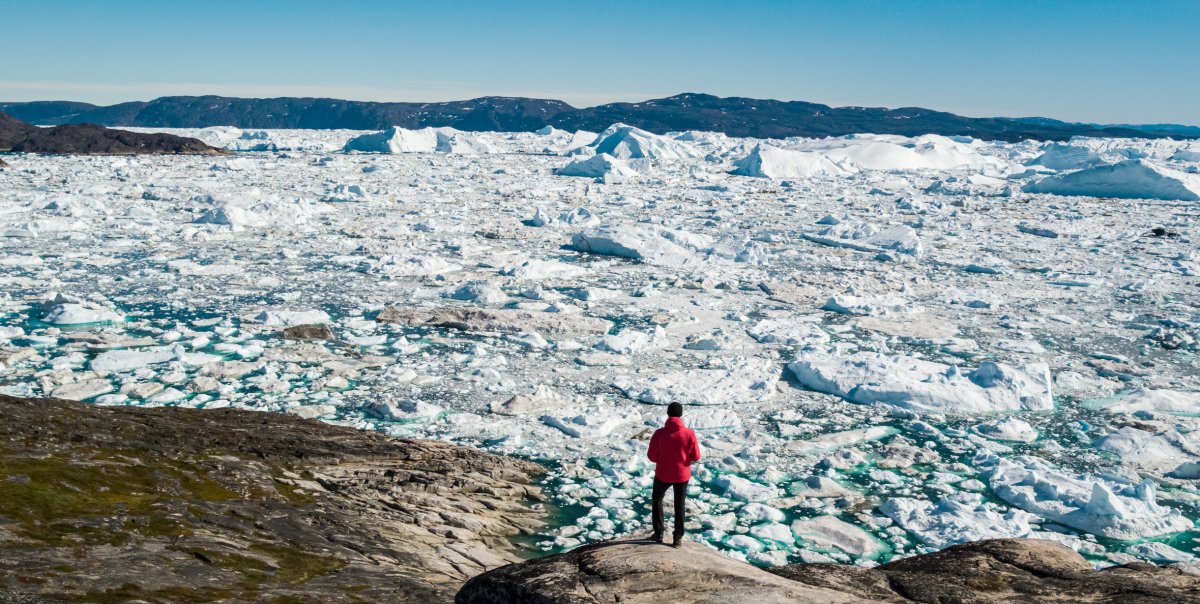As Greenland's ice sheets melt at an unprecedented pace, prospectors are moving in to find what treasures could be hidden underneath.
As the global economy shifts away from fossil fuels, the demand for electric vehicles and the raw materials used to make their batteries has skyrocketed. Analysts have forecasted that we will need to establish over 300 new mines over the next decade to keep up with this demand.
The challenge is knowing where to open them.
"Out of every 200 projects, 199 of them fail to find an economic ore body," Josh Goldman, the president of the startup KoBold Metals, told Newsweek. "The industry is getting worse at finding ore deposits. The ones that are easy to find have already been found—that's the low-hanging fruit."

KoBold Metals hope to get around this problem by using artificial intelligence to more accurately predict the location of these sites and therefore accelerate their discovery. One area that has received particular interest is Greenland.
"Greenland has the potential to be one of the best discoveries of the past 100 years," Goldman said. "We think there are extraordinary rocks and we think it is a very good place to be a responsible operator."
There are certain geological features that prospectors look for when deciding to open a new mine.
"An ore deposit that you can mine is a place where nature has taken a lot of metals from a large volume of rocks and concentrated them into a small place where you can take them out economically. In the ground under your feet right now there's copper, there's uranium, there's gold, there's everything...they're just present in very, very small quantities," Goldman said.
"What we are looking for is places where nature has gathered up all those metals from a very large volume of rock and concentrated them somewhere where you can actually extract them. Those are incredibly rare events—they don't happen in most places and they're very small and very far apart.
"We need there to be the right kind of rocks, where there's some evidence that those natural processes were at work, where there's a good chance that we could actually find an economic concentration of those metals.
"The reason Greenland is so interesting...is because there is a lot of evidence that those natural geological processes were at work over the last hundreds of millions of years on Earth...There are tantalizing clues on the surface and that's just the tip of the iceberg."
While this is exciting from a geological perspective, Joerg Schaefer, a climate geochemist at the Columbia Climate School's Lamont-Doherty Earth Observatory who is researching the Greenland ice sheet, has some reservations.
"There is a lot of potential to make money from the ice sheet in terms of these minerals, that is no question," he told Newsweek. "But the land of Greenland belongs to the Greenland people. How can it be legal that a bunch of billionaires go in and steal the minerals from a land that is not theirs?"
Goldman stressed that his team was actively working with the people of Greenland, as opposed to exploiting them, to generate these resources.
"Ultimately, they're the ones who own the resources. Greenland is interested in and receptive to partners from outside Greenland coming in because actually finding mineral resources requires a lot of technical expertise and it requires putting a lot of capital at risk," he said.
"A very large fraction of the value that gets created ultimately accrues to the local government and community in the form of royalties and various kinds of taxes," he added. "Greenland is one of many places we are looking at–we're also looking at Canada, we're looking at the United States, we're looking at Australia, we're looking in southern Africa."
The reason Greenland has caused such a stir is largely due to the fact that, until recently, most of it was totally inaccessible. There are some who have argued that mining in areas that were previously covered in ice could be seen as profiteering from the climate crisis.

"Our interest is in preventing and reversing climate change," Goldman said. "Yes [climate change] will expose more rocks, but there's no joy in having more rocks, not under the ice."
He added that the areas his team had most actively been exploring were very near Greenland's coast and not actually under the ice sheet. Another key issue with mining is the effect it can have on the surrounding environment.
"The inevitable fact here is that mining disturbs the ground. You have to dig rocks out of the ground," Goldman said. But with careful planning and more accurate discovery, these issues can be somewhat reduced.
"Thinking about where all the waste rock is going to go, where the water is going to come from and where it's going to go, and making sure that these are baked into the design of the mine is really critical," he explained. "You can also reduce the amount of waste that you generate in the first place by searching for really high-quality ore bodies.
"Nobody wants a mine in their backyard and nobody wants a mine in a pristine undeveloped area [but] the materials are going to be coming from somewhere. We need to develop these resources responsibly."
Uncommon Knowledge
Newsweek is committed to challenging conventional wisdom and finding connections in the search for common ground.
Newsweek is committed to challenging conventional wisdom and finding connections in the search for common ground.
About the writer
Pandora Dewan is a Senior Science Reporter at Newsweek based in London, UK. Her focus is reporting on science, health ... Read more
To read how Newsweek uses AI as a newsroom tool, Click here.





